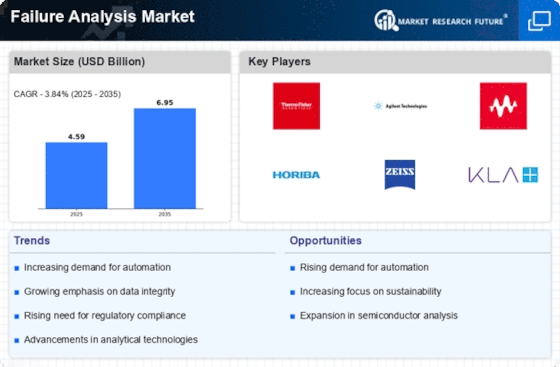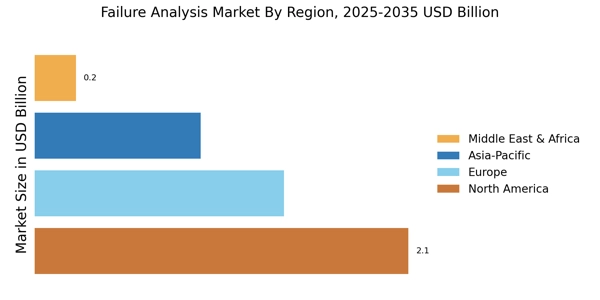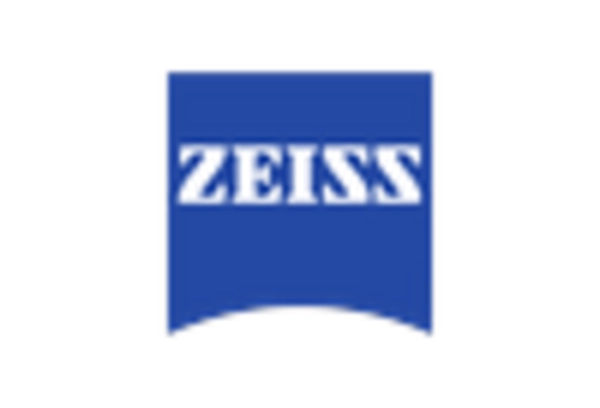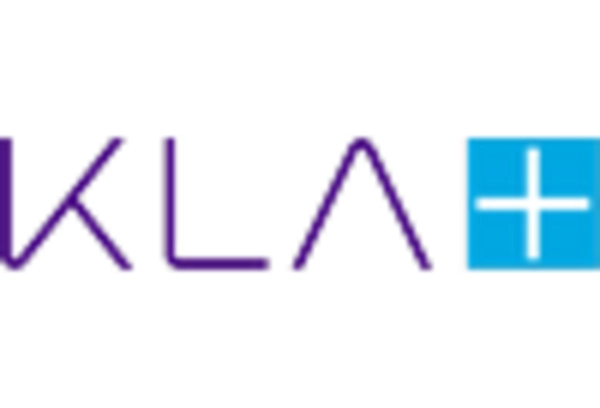Increased Focus on Risk Management
The heightened focus on risk management within organizations is driving growth in the Failure Analysis Market. Companies are increasingly recognizing the importance of identifying and mitigating risks associated with product failures. This shift is particularly pronounced in industries where safety is paramount, such as aerospace and healthcare. Organizations are adopting failure analysis as a proactive measure to prevent costly failures and enhance operational efficiency. The market is projected to expand as businesses invest in failure analysis tools and methodologies to strengthen their risk management frameworks. By integrating failure analysis into their operational strategies, companies can not only reduce the likelihood of failures but also improve their overall resilience in a competitive landscape.
Rising Demand for Quality Assurance
The increasing emphasis on quality assurance across various industries is a primary driver for the Failure Analysis Market. Companies are investing significantly in failure analysis to ensure product reliability and safety. This trend is particularly evident in sectors such as aerospace, automotive, and electronics, where the cost of failure can be exorbitant. According to recent data, the failure analysis market is projected to grow at a compound annual growth rate of approximately 8% over the next five years. This growth is fueled by the need for rigorous testing and validation processes, which are essential for maintaining competitive advantage. As organizations strive to enhance their quality control measures, the demand for failure analysis services and technologies is likely to escalate, thereby propelling the market forward.
Growing Complexity of Products and Systems
The increasing complexity of products and systems across various industries is a significant driver for the Failure Analysis Market. As products become more sophisticated, the likelihood of failures also rises, necessitating comprehensive failure analysis to identify root causes. Industries such as telecommunications, automotive, and medical devices are particularly affected, as they incorporate advanced technologies and intricate designs. This complexity not only complicates the manufacturing process but also heightens the need for effective failure analysis to ensure compliance with safety standards. Market data indicates that the demand for failure analysis services is expected to rise in tandem with the growing intricacy of products, as companies prioritize risk management and reliability in their development processes.
Regulatory Pressures and Compliance Requirements
Regulatory pressures and compliance requirements are significant drivers of the Failure Analysis Market. As industries face stricter regulations regarding product safety and performance, the need for thorough failure analysis becomes increasingly critical. Regulatory bodies are mandating comprehensive testing and validation processes to ensure that products meet safety standards. This trend is particularly evident in sectors such as pharmaceuticals, automotive, and aerospace, where compliance failures can result in severe penalties and reputational damage. The market for failure analysis services is expected to grow as companies strive to meet these regulatory demands, investing in advanced analysis techniques and methodologies to ensure compliance and maintain market access.
Technological Advancements in Analysis Techniques
Technological advancements are reshaping the Failure Analysis Market, introducing innovative techniques that enhance the accuracy and efficiency of failure investigations. The integration of artificial intelligence and machine learning into failure analysis processes allows for more precise data interpretation and predictive analytics. These technologies enable organizations to identify potential failure modes before they occur, thus reducing downtime and associated costs. Furthermore, the adoption of advanced imaging techniques, such as scanning electron microscopy, has improved the ability to analyze materials at a microscopic level. As these technologies continue to evolve, they are expected to drive the demand for failure analysis services, as companies seek to leverage these advancements to improve product performance and reliability.
















